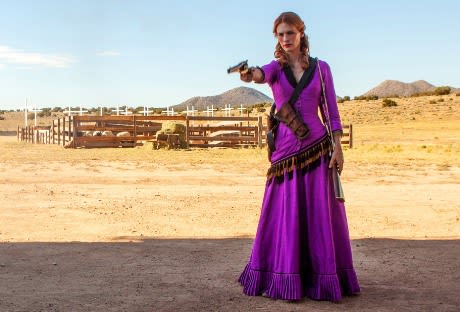It's no mistake that the Western genre pops up to revise and assess the cultural climate during conservative, superficial times. Leading up to wartime and during any industrial era, the Western has been a popular indicator of staunch, traditionalist values or an underlying cultural need to cull, or simplify, seemingly problematic worldviews.
As of late, there's been a revisionist take on the genre that either waxes nostalgic for simpler times when power and ideology was implicitly male or one that criticizes the very foundations of America, suggesting that current problems were born long before our generation walked this earth. Logan Miller's exceedingly simplistic vengeance tale, Sweetwater, takes the latter approach to American demystification, using a pseudo-progressive template of genre subversion and feminist empowerment that is far less schooled than it is titillating.
It's all spelled out with clumsy didactic, setting up conflict with a broad, black and white, ethos by positing religious hypocrisy in the form of Prophet Josiah (Jason Isaacs) and greedy bankers as the antagonists. After killing two men for stealing and eating one of his sheep, using scripture as his mode of justification, Josiah contrarily attacks a humble couple—ex-prostitute Sarah (January Jones) and Mexican farmer Miguel (Eduardo Noriega)—for asking him to keep his sheep from eating their crops.
Director Logan Miller isn't subtle with his condemnation of religious and financial modes of oppression, surrounding Josiah with flames and crosses whenever possible, juxtaposing it with the natural lights and earthy background of Sarah and Miguel's simple country life. Even the bankers that steal Sarah's money, claiming service fees, are drawn with cartoonish villainous, cackling and sneering as the reminder her of her lascivious roots.
Because of this, the overly cavalier and jovial manner in which Sheriff Jackson (Ed Harris) rides into town, looking for justice in the slaughter of two men passing through, matches the existing comic book tone. But rather than posit this outsider as a traditionalist cowboy hero, Sheriff Jackson merely aids a vengeful Sarah once she starts running around town graphically killing everyone that has ever wronged her.
Since Sweetwater vacillates between didactic and embracing the camp cheesiness of its own limitations, it's hard to get a firm grasp of intent. When Sarah is sodomizing men with guns and shaking her tits around to distract men as she murders them, the unintentionally sexist—and exploitive—counter-intuitive hippie-dippy ethos of the film works in part as a messy, confused and outdated camp comedy. But within the text seems to be a genuine kernel of academic intent, suggesting that Sarah's thwarting of the traditional Western format by taking charge of the situation (in the form of a male fantasy) while the traditionalist cowboy hero goes all CSI over crime scenes is a modernist, feminist plea.
The end result is a bit perplexing, albeit viscerally entertaining, in its broad idealism and juvenile assertions. When Sweetwater embraces its own absurdity, it's actually quite entertaining. It's just unfortunate that it seems to be taking itself seriously.
(ARC Entertainment)As of late, there's been a revisionist take on the genre that either waxes nostalgic for simpler times when power and ideology was implicitly male or one that criticizes the very foundations of America, suggesting that current problems were born long before our generation walked this earth. Logan Miller's exceedingly simplistic vengeance tale, Sweetwater, takes the latter approach to American demystification, using a pseudo-progressive template of genre subversion and feminist empowerment that is far less schooled than it is titillating.
It's all spelled out with clumsy didactic, setting up conflict with a broad, black and white, ethos by positing religious hypocrisy in the form of Prophet Josiah (Jason Isaacs) and greedy bankers as the antagonists. After killing two men for stealing and eating one of his sheep, using scripture as his mode of justification, Josiah contrarily attacks a humble couple—ex-prostitute Sarah (January Jones) and Mexican farmer Miguel (Eduardo Noriega)—for asking him to keep his sheep from eating their crops.
Director Logan Miller isn't subtle with his condemnation of religious and financial modes of oppression, surrounding Josiah with flames and crosses whenever possible, juxtaposing it with the natural lights and earthy background of Sarah and Miguel's simple country life. Even the bankers that steal Sarah's money, claiming service fees, are drawn with cartoonish villainous, cackling and sneering as the reminder her of her lascivious roots.
Because of this, the overly cavalier and jovial manner in which Sheriff Jackson (Ed Harris) rides into town, looking for justice in the slaughter of two men passing through, matches the existing comic book tone. But rather than posit this outsider as a traditionalist cowboy hero, Sheriff Jackson merely aids a vengeful Sarah once she starts running around town graphically killing everyone that has ever wronged her.
Since Sweetwater vacillates between didactic and embracing the camp cheesiness of its own limitations, it's hard to get a firm grasp of intent. When Sarah is sodomizing men with guns and shaking her tits around to distract men as she murders them, the unintentionally sexist—and exploitive—counter-intuitive hippie-dippy ethos of the film works in part as a messy, confused and outdated camp comedy. But within the text seems to be a genuine kernel of academic intent, suggesting that Sarah's thwarting of the traditional Western format by taking charge of the situation (in the form of a male fantasy) while the traditionalist cowboy hero goes all CSI over crime scenes is a modernist, feminist plea.
The end result is a bit perplexing, albeit viscerally entertaining, in its broad idealism and juvenile assertions. When Sweetwater embraces its own absurdity, it's actually quite entertaining. It's just unfortunate that it seems to be taking itself seriously.
